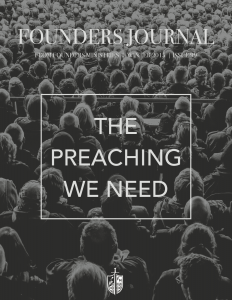Are we evangelicals odd and offensive? Perhaps we act oddly at times or do some offensive things. But I’m referring specifically to those things related to the gospel. We sing things like, “In the Cross of Christ I Glory,” “The Power of the Cross,” and “Lift High the Cross.” We quote biblical phrases such as, “But may it never be that I would boast, except in the cross of our Lord Jesus Christ,” “I have been crucified with Christ,” and “I determined to know nothing among you except Jesus Christ, and Him crucified” (Galatians 6:14; Galatians 2:20; 1 Corinthians 2:2). Apart from evangelical circles and those representing historic Christianity, the idea of glorying in the cross sounds repulsive!
Think of it like this: would any of us sing, “Lift High the Electric Chair”? Or sing, “The Power of the Hangman’s Noose”? Or, would we never boast except in the gas chamber? Or pipe out, “In the Firing Squad I Glory”?
Admittedly, we can sing and talk about the cross without it deeply, even viscerally affecting us. But suppose we introduced the cross of Christ to someone in the Islamic or Buddhist or animistic world? Such an idea of boasting about and glorying in the cross—an instrument of torturous death for criminals—would not just be foreign to them but highly offensive, just like talking about glorying in the electric chair. For them, to embrace the crucified Messiah could mean complete separation from family and culture—and indeed, countless times it has.
Yet our singing and talking about the cross of Christ remains central to our understanding of the teaching of the Bible, the purpose of God, and our eternity. We dare not skip on the cross! Or else we become like those that have abandoned the faith for a generic, powerless Christianity—devoid of the substitutionary, atoning death of Christ in that bloody, wrath-absorbing death on the cross.
Paul certainly faced the same type of issues in Corinth. For Romans, the only people who adorned a cross were those nailed to one as a non-Roman criminal. The noted Roman orator Cicero, while defending a man indicted by Julius Caesar, gives us an idea of what his generation thought of this instrument of the cross: “The very word ‘cross’ should be far removed not only from the person of a Roman citizen but from his thoughts, his eyes and his ears.” For sophisticated Greeks who prized philosophical discussions, talk of the cross would be inadmissible, and considered blatantly stupid. For Jews to hear of preaching Messiah crucified (that’s what “Christ crucified” means) would be blasphemous and appalling.
Yet Paul determined to know nothing among the Corinthians “except Jesus Christ, and Him crucified” (1 Corinthians 2:2). He summarized the whole of his message to the Gentile world in four words: “we preach Christ crucified” (1 Corinthians 1:23). He called the cross of Christ the power and wisdom of God (1 Corinthians 1:18, 24). Preaching “the word of the cross” (1 Corinthians 1:18) implied preaching the whole gospel, as he used the phrase as a synecdoche, where the part represents the whole. It encompassed the eternal plan of God established before the foundation of the world by which God would redeem a fallen people through the only means possible: God the Son entering the human race in the Incarnation, becoming a member of the very people that He came to redeem, fulfilling the Law’s demands, and dying innocently as the sin-bearer on the cross. Triumphant over sin and death, breaking the curse of the fall, and restoring the cosmos affected by the invasion of sin, the resurrected Christ did indeed finish the work of redemption! (Cf. 1 Corinthians 1:26–31; Ephesians 1:3–14; 2:1–3:13; Galatians 4:1–7; Romans 8:18–39). The preaching of the cross ties together the whole of biblical revelation.
Do we grasp how strange those four words—“we preach Christ crucified”—would have been to Paul’s audience in Corinth or Ephesus or later in Rome? More than strange—do we realize how utterly ridiculous such proclamation appeared? Yet Paul, and his apostolic colleagues, and faithful believers—including many reading this post—through the centuries have joined together to glory in and proclaim the cross of Christ.
At one and the same time, the cross is the most despised and the most cherished of all objects in human history. Families have divided over it; countless men and women have been, and continue to be martyred because of it; co-workers, fellow students, and relatives have avoided it; and multitudes in diverse cultures and settings have experienced its power. And so “we preach Christ crucified, to Jews a stumbling block and to Gentiles foolishness, but to those who are the called, both Jews and Greeks, Christ the power of God and the wisdom of God” (1 Corinthians 1:23–24). Whenever we find ourselves tempted to slip into moralistic, therapeutic, or legalistic preaching and teaching, then meditate once again upon four words that embody the whole of our ministries as followers of Jesus Christ: “we preach Christ crucified.”























